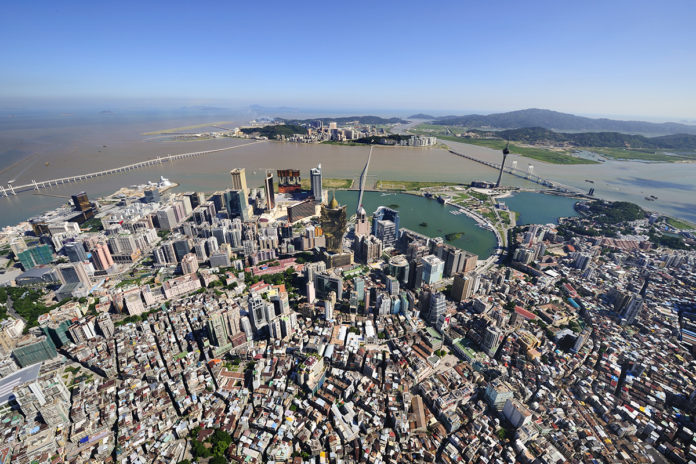Any ban on smoking in Macau’s casinos could lead to a 10 to 15 percent drop in casino revenues in the long term, an American gaming industry organisation has warned. The American Gaming Association is a gaming lobby group made up of well-known corporations in the industry, including Macau players Las Vegas Sands and MGM Mirage. The association’s president and chief executive, Frank Fahrenkopf Jr, was in Macau recently, revealing the results of a survey of 21 of Asia’s gaming industry elites – including a handful of casino CEOs – and talking to the media. “There’s usually a drop of 20 percent in revenue in the first year, as witnessed in former instances in the US, New Zealand and other nations. And I gather that it’ll be significantly more than 20 percent [in Macau] because I noticed that in Asia more people smoke”, Mr Fahrenkopf said. Over a sustained period of time, he said the loss in revenue might be about 10 to 15 percent, because “in almost all countries, people who like to play also like to smoke”. Up in smoke In both Las Vegas and Macau, smoking is currently allowed inside casinos. Nevada passed a law prohibiting smoking indoors in 2006 but exempted the casinos. The concession posed a serious threat to the health of hospitality workers, and anti-tobacco activists vented their anger on the gaming venues. The Aria Resort and Casino, which opened in Las Vegas last year, was the first to separate croupiers and players by a moving air curtain and extraction system. But even the Aria was not spared from protesters demanding a full ban. University of Macau professor of economics Ricardo Siu suggests that the actual losses flowing from a smoking ban cannot be substantiated because clean air might attract new customers that were previously bothered by smoke. The percentage of players who smoke in Macau is also under a cloud. According to media reports and a message from legislator Ng Kuok Cheong, published on Facebook, government representatives agreed to a transition period of three years before applying a definitive ban on smoking in Macau’s casinos. Fellow legislator Ho Sio Kam said she had heard nothing about the matter. Macau and Vegas still kings The gaming association’s survey of industry leaders concluded that Macau would not be challenged by Asia’s emerging gaming destinations inside the next decade. Instead, the competition could work in the city’s favour, attracting more visitors to established destinations like Macau. Macau’s leadership in the Asian market was universally regarded as undisputed for the next decade but Mr Fahrenkopf said he was surprised to see Japan mentioned by eight of the respondents as the market that will emerge as Asia’s second biggest, even though the merits of the industry are still being debated there. After Japan, Singapore, the Philippines and Taiwan were regarded as the next most important markets. Mr Fahrenkopf said instability in Japan could pose a problem. “The legalisation of casinos does not do well with political instability. I think it will still take some time [until Japan has casinos],” he said. He did say there were investors poised, waiting for the doors to open. The survey indicated that 14 respondents believed that the top Asian markets would generate more revenue than all of North America’s casinos inside three to five years. A leadership role In Mr Fahrenkopf’s view, limited openings of new casinos in new jurisdictions leads to more visitors and would eventually lead players to make further trips to mature destinations, where entertainment options are more established. “Las Vegas is a very special place in the gaming world and I think that people who experience Macau or Singapore will eventually want to go one day to the United States,” he said. “I think people who are exposed to what is being offered there [in Singapore] will want to come to Macau, especially when the whole [Cotai] Strip is built,” he added. Slot machines are one area where Singapore already competes with Macau. Association of Gaming Equipment Manufacturers executive director Marcus Prater noted that earnings per machine at Genting’s Resorts World Sentosa were about US$700 (MOP5,507) a day and US$450 a day at Marina Bay Sands. In comparison, the Sands Macau earns about US$175 from each of its machines every day. While the Gary Loveman, chief executive officer at Harrah’s Entertainment says his group maintains a strong interest in entering the Macau market, Mr Fahrenkopf was wary on what space could be found for new operators. Stressing that the industry must find the right balance with the Government in building the city’s infrastructure and controlling rapid growth, he said the limits on the number of gaming tables could benefit existing operators, but additional quality facilities on a grand scale would attract more visitors and bring “fair returns” for everyone. The ‘alternative’ Galaxy Two massive projects in Cotai are expected to open before the end of 2012 and will have to compete for the remaining 600 tables in the quota to fill their gaming halls or, as suggested by Secretary for Economy and Finance Francis Tam Pak Yuen, transfer tables from casinos in other parts of Macau. Galaxy Entertainment Group’s deputy Chairman Francis Lui Yiu Tung has not announced if there is a need to transfer gaming tables to the Galaxy Resort at Cotai. Mr Lui gave a keynote speech at the Global Gaming Expo Asia where he detailed the thinking behind the resort. He told the lunch-time crowd that the Cotai project was built to resemble a tropical resort to take advantage of the mainland’s growing middle class market. On the same latitude as Hawaii, Cancun and the Bahamas, and with a “cultural advantage”, Mr Lui said the city would have a competitive edge attracting tourists seeking a resort-style break.
—
























